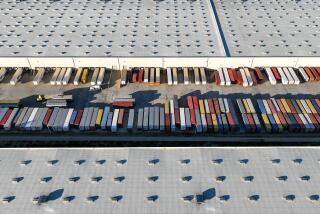Cleaning up the ports
Re “A shipshape bill,” editorial, July 21
By indiscriminately imposing additional container fees on port users, state Sen. Alan Lowenthal’s SB 974 runs counter to local plans that provide incentives to those who invest in cleaning up our ports and would assess penalties on those who do not. It also ignores what many industry leaders are already doing on their own to help clean the air in Southern California.
Members of the Coalition for Responsible Transportation, a group of leading retailers and transportation companies, are voluntarily purchasing trucks that run on natural gas and newer, low-emission diesel trucks, putting these cleaner vehicles on the road at their own expense. However, SB 974 treats a company using a 20-year-old truck spewing dirty diesel fumes the same as one that has invested in a clean 2007 truck running on natural gas. Both would pay the same mitigation fees under the Lowenthal bill.
The CRT supports Lowenthal’s admirable goals. Unfortunately, his bill provides no incentives to companies to purchase cleaner equipment for use at the Long Beach and Los Angeles ports because owners of older, dirtier equipment will be assessed the SB 974 fee regardless of whether they invest in new trucks.
Conversely, imposing the SB 974 fee on shippers that have made the switch to green equipment effectively punishes the companies that have already invested in newer, cleaner trucks.
James Jack
Sacramento
The writer is spokesman for the Coalition for Responsible Transportation.
Re “National trucking group to sue ports over cleanup plan,” July 26
Kudos to L.A. Mayor Antonio Villaraigosa for recognizing that the city has a moral mandate to act “when thousands of lives are cut short every year by toxic emissions from the port.” The mayor should go after the far larger source of the most toxic pollutants from port operations: Ships are responsible for 60% of the worst pollutants from port operations, and trucks less than 10%.
The mayor could stand with the community, the ports, the South Coast Air Quality Management District and the California Air Resources Board to help require that shippers use cleaner, low-sulfur fuel now. Relying on incentive programs and the proposed 2012 Air Resources Board rule for low-sulfur fuel is not adequate.
Richard Havenick
San Pedro
More to Read
Sign up for Essential California
The most important California stories and recommendations in your inbox every morning.
You may occasionally receive promotional content from the Los Angeles Times.










![[20060326 (LA/A20) -- STATING THE CASE: Marchers organized by unions, religious organizations and immigrants rights groups carry signs and chant in downtown L.A. "People are really upset that all the work they do, everything that they give to this nation, is ignored," said Angelica Salas of the Coalition of Humane Immigrant Rights. -- PHOTOGRAPHER: Photographs by Gina Ferazzi The Los Angeles Times] *** [Ferazzi, Gina -- - 109170.ME.0325.rights.12.GMF- Gina Ferazzi/Los Angeles Times - Thousands of protesters march to city hall in downtown Los Angeles Saturday, March 25, 2006. They are protesting against House-passed HR 4437, an anti-immigration bill that opponents say will criminalize millions of immigrant families and anyone who comes into contact with them.]](https://ca-times.brightspotcdn.com/dims4/default/34f403d/2147483647/strip/true/crop/1983x1322+109+0/resize/840x560!/quality/75/?url=https%3A%2F%2Fcalifornia-times-brightspot.s3.amazonaws.com%2Fzbk%2Fdamlat_images%2FLA%2FLA_PHOTO_ARCHIVE%2FSDOCS%2854%29%2Fkx3lslnc.JPG)